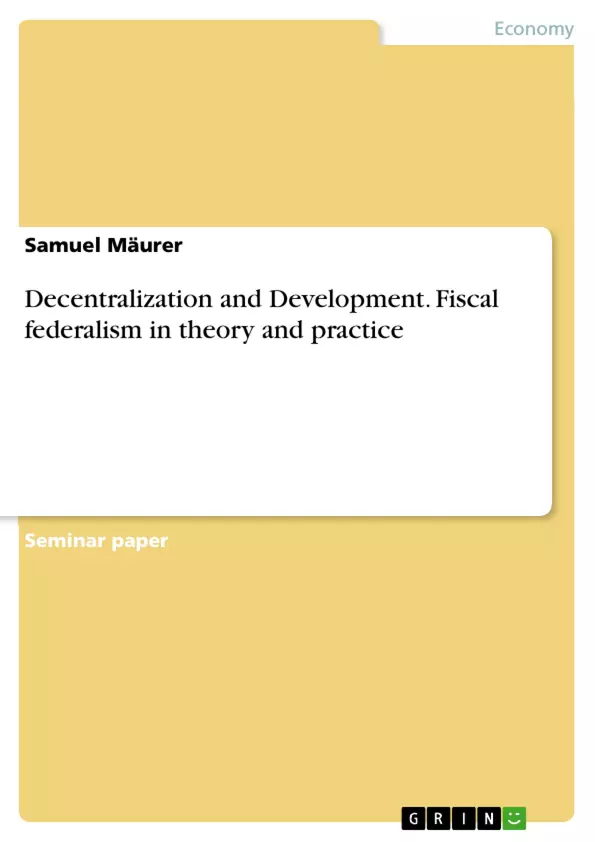This seminar paper deals with a critical discussion of the economic insight from chapter 8: Decentralization and development of the Handbook on Fiscal Federalism. Decentralization is generally defined as the transfer of certain administrative and fiscal functions or powers of a central authority to several local authorities. The main advantage of local decentralization is that local governments are more efficient at providing certain public services compared to the higher levels of government Oates (1972).
The chapter focuses on the type of decentralization in developing and transition economies, on the transfer of political decision-making power to subnational levels of government and cases where local community organizations formally participate in the implementation of funded and centrally directed projects. It’s important to mention that the chapter distinguishes decentralization in the sense of decentralization of political decision-making power from administrative delegation of functions of the central government to the local one. However, the effects of a policy of decentralization may differ sustainably. Like the common case when the central government delegates responsibility for social sector expenditure to local authorities in the form of unfunded mandates, which results in a closure of the social programmes.
Decentralization can be used to serve the political power of the central government to dispel some authority, when the central control might be threatened by regional interest. During the apartheid regime in South Africa, decentralization was used as an instrument of central control and racial division. But on the other hand, it also has positive effects where decentralization is the result of the recent transition from authoritarianism to democracy, as in countries such as Brazil or Indonesia.
Inhaltsverzeichnis (Table of Contents)
- INTRODUCTION
- DEPARTURES FROM THE FISCAL FEDERALISM LITERATURE
- ADAPTATION OF DECENTRALIZATION FOR DEVELOPING COUNTRIES
- EMPIRICAL EVALUATION OF DECENTRALIZED DELIVERY OF PUBLIC SERVICES
- DECENTRALIZATION AND BUSINESS DEVELOPMENT
- CONCLUSION
Zielsetzung und Themenschwerpunkte (Objectives and Key Themes)
This seminar paper examines the economic implications of decentralization in developing countries, drawing upon the insights from the Handbook on Fiscal Federalism. The primary objective is to critically assess the applicability of traditional fiscal federalism theories within the context of developing economies, highlighting their limitations and proposing adaptations for a more effective approach. This involves exploring the potential benefits and drawbacks of decentralization in diverse territorial domains and examining the role of political accountability in shaping its effectiveness.
- The limitations of traditional fiscal federalism literature in the context of developing countries
- Adapting decentralization strategies to address the unique challenges and opportunities in developing economies
- The importance of political accountability and the role of local institutions in promoting effective decentralization
- Exploring the impact of decentralization on the delivery of public services and local business development
- The influence of political economy and corruption on the success of decentralization programs
Zusammenfassung der Kapitel (Chapter Summaries)
- Introduction: This chapter introduces the topic of decentralization and development, defining the concept and outlining its potential advantages and challenges. It emphasizes the importance of considering the specific context of developing countries and the need for alternative approaches to traditional fiscal federalism theories.
- Departures from the Fiscal Federalism Literature: This chapter delves into the limitations of the traditional fiscal federalism literature, highlighting its lack of applicability in developing countries. It discusses key assumptions that fail to hold in these contexts, such as population mobility, automatic allocation of funds, and the strength of local institutions.
- Adaptation of Decentralization for Developing Countries: This chapter explores how the principles of decentralization can be adapted to fit the unique characteristics of developing countries. It examines the influence of political agency, intergovernmental problems, and the potential for corruption. The chapter also discusses different financing mechanisms for local governments, analyzing the trade-offs between local taxes, user fees, and central grants.
Schlüsselwörter (Keywords)
The core focus of this seminar paper is decentralization in developing countries, with a specific emphasis on the limitations and adaptations of the fiscal federalism literature. Key themes and concepts include political accountability, corruption, local institutions, public service delivery, and local business development. The discussion also encompasses elements of political economy, intergovernmental relationships, and the importance of tailored approaches to addressing the unique challenges of developing economies.
Frequently Asked Questions
What is fiscal federalism in the context of development?
It refers to the study of how administrative and fiscal powers are transferred from central to local authorities to improve efficiency in public service delivery in developing countries.
What are the main advantages of decentralization?
Local governments are often more efficient at providing public services because they have better information about local needs and preferences compared to central authorities.
Why do traditional fiscal federalism theories often fail in developing nations?
Assumptions like high population mobility or strong local institutions often do not hold true in developing contexts, requiring adapted decentralization strategies.
How can decentralization be misused politically?
Central governments may use it to dispel authority when threatened by regional interests, as seen during the apartheid regime in South Africa for racial division.
What role does corruption play in decentralization programs?
Corruption and political economy can undermine the success of decentralization, making political accountability and strong local institutions vital for effective implementation.
- Quote paper
- Samuel Mäurer (Author), 2019, Decentralization and Development. Fiscal federalism in theory and practice, Munich, GRIN Verlag, https://www.hausarbeiten.de/document/1176440


